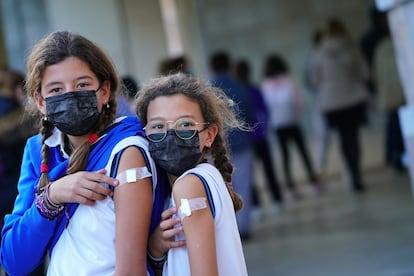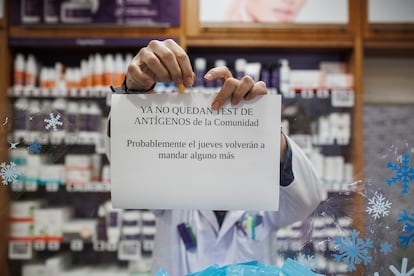Spanish PM: ‘Families will be able to celebrate Christmas together’
The vaccination drive is picking up pace in Spain, while in Madrid many parents have opted not to send their children to school due to the spike in coronavirus cases

The Spanish Health Ministry reported a record number of new coronavirus infections on Tuesday, the highest number seen since the pandemic began and accurate figures have been recorded. A total of 49,823 cases were reported yesterday, with 94 deaths added to the overall toll. The cumulative incidence rose another 86 points, to reach 695 cases per 100,000 inhabitants over the last 14 days. The previous record for new infections was recorded on January 21, with 44,357 cases.
Meanwhile, there are currently 7,634 coronavirus patients in Spain’s hospitals, an increase of 133 compared to the day before. Covid-19 cases occupy 16% of the country’s intensive care unit (ICU) beds. In total, 5,585,054 infections have been recorded and 88,887 people have died after testing positive for Covid-19 since the pandemic began.
Here is a round-up of the latest news in Spain.
Spanish PM on Christmas
Spanish Prime Minister Pedro Sánchez, of the Socialist Party, announced on Wednesday that families will be able to celebrate Christmas together, despite the rise in coronavirus cases.
“Parents and mothers, grandfathers and grandmothers will be able to come together with their children and grandchildren,” Sánchez told Congress at the last question and answer session for the year. The Socialist Party leader was responding to attacks from opposition leader Pablo Casado, of the conservative Popular Party (PP), who accused Sánchez of not doing “anything” to address the sixth wave and leaving families “in distress” due to the uncertainty of whether restrictions on social gatherings will be introduced.
In response, Sánchez maintained that: “The truth is that, faced with such a great calamity, Spain has resisted, it has not been defeated and is advancing.”
Catalonia does U-turn
The Catalan health department has done a U-turn on its decision regarding quarantines for close contacts of coronavirus cases. Last Thursday, it announced that all close contacts would have to self-isolate for 10 days, even if they were fully vaccinated. But on Wednesday, Catalan health authorities said the region would follow the decision reached by the Public Health Commission, which agreed that fully vaccinated close contacts of cases would not have to observe a 10-day quarantine. This update to the protocol will limit obligatory quarantine just to unvaccinated contacts and people with suppressed immune systems or contacts with the beta or gamma variants (these strains are not widely circulating in Spain).
Vaccination
The vaccination campaign has picked up the pace in Spain over the last two weeks. The explosion of cases in recent days and the uncertainty over the omicron variant has prompted the administration of booster shots as well as the vaccination of children aged from five to 11, which got going just a few days ago.
In the last week, eight doses have been administered for every 100 people, which is close to the record set in July, when the campaign was rolled out to young people. Two months ago the rate was barely a 10th of this level, and a month ago it was a quarter.
Spain began to administer booster shots in October, first in care homes and then among vulnerable people due to preexisting conditions. Then the extra doses were approved for the over-70s, and now the over-60s. These booster shots account for 90% of those administered in November and December. Last Thursday, the Spanish Health Ministry also approved booster shots for the over-40 population.
Spain is, however, lagging behind other European countries with this part of the campaign. But in the last two weeks the pace has picked up, and now they are being administered faster than the EU average.
As for children, so far 13.4% of the country’s 3.3 million children aged five to 11 have received their first dose of the Pfizer-BioNTech pediatric vaccine.
Madrid
With a record 11,221 new coronavirus cases reported on Tuesday in the Madrid region, citizens are taking matters into their own hands given the inaction of the authorities. Despite the spike in cases, the regional government – which is run by the conservative Popular Party with the support of far-right Vox – is not planning on bringing in any new restrictions for now, with just masks required indoors.
Many parents are opting not to take their children to school for the remaining days of the current term, with more and more principals advising them to do so. Students have even been advised to take their materials with them, on the basis that the situation could worsen in January and schools may return to online teaching.
The hospitality sector in Madrid, meanwhile, has seen between 30 and 40% of reservations canceled in the last week, while traffic levels in the city center have fallen by nearly 7%.

Antigen home-testing kits have sold out in nearly all pharmacies, and a couple who were due to get married on Monday have opted to cancel with their guests at the last minute.
Given the overload of the healthcare system, the regional government has decided to register positive cases detected using home-testing kits purchased at pharmacies as official infections, and will no longer routinely require these to be confirmed by testing at healthcare centers.
High vaccination levels among the population of Madrid – 88.6% of the target population has full protection – mean that there are just 751 Covid-19 patients in the region’s hospitals right now, with 151 in intensive care units (ICUs) according to the latest figures.
Working from home
Spanish telecoms giant Telefónica has reached an agreement with labor unions to allow its entire workforce to work from home until January 7, given the new spike in coronavirus cases. The company’s leadership committed to holding a new meeting to decide on what measures, if any, should be adopted after this date, including the possibility of extending this deadline should the high incidence of Covid-19 continue. If not, the current schedule of two days of regulated homeworking plus one flexible day, as set out in the company’s collective agreement, will be put back into place.
Confirmed infections
The general secretary of the main opposition Popular Party (PP), Teodoro García Egea, confirmed on Tuesday that he had tested positive for the coronavirus and would be self-isolating. Via a message on Twitter, he confirmed that his family were “doing fine,” and called on people to “take care and exercise maximum caution.”
His colleague in the PP, José Luis Martínez-Almeida, who is party spokesperson and the mayor of Madrid, also announced yesterday that he was positive. He said via Twitter that it would be “a different kind of Christmas,” but that he would continue “to fulfill my obligations from home.” He also called on people to take care.
In sports, one of Rafael Nadal’s tennis coaches, Carlos Moyà, also confirmed on Tuesday that he had tested positive for the coronavirus. The announcement came after Nadal himself made his diagnosis public earlier this week. The Spanish tennis star had shared a meal with Spain’s former king, Juan Carlos, before his test came back positive. According to the Royal Household, however, the emeritus king tested negative for the virus after the encounter.
The Real Madrid basketball team announced on Tuesday that players Anthony Randolph, Guerschon Yabusele and Juan Núñez had all tested positive for Covid-19. This was in addition to the already confirmed cases of players Vincent Poirier, Fabien Causeur and Thomas Heurtel, and coach Pablo Laso. The team is due to play CSKA Moscow on Thursday at the WiZink Center in Madrid.
In women’s soccer, a match on Tuesday between Athletic and Atlético de Madrid was postponed due to an outbreak of the coronavirus among the latter team. Five players and the coach, Óscar Fernández, all tested positive via a PCR. These new cases are in addition to that of player Amanda Frisbie, whose infection became public last Friday.
Tu suscripción se está usando en otro dispositivo
¿Quieres añadir otro usuario a tu suscripción?
Si continúas leyendo en este dispositivo, no se podrá leer en el otro.
FlechaTu suscripción se está usando en otro dispositivo y solo puedes acceder a EL PAÍS desde un dispositivo a la vez.
Si quieres compartir tu cuenta, cambia tu suscripción a la modalidad Premium, así podrás añadir otro usuario. Cada uno accederá con su propia cuenta de email, lo que os permitirá personalizar vuestra experiencia en EL PAÍS.
¿Tienes una suscripción de empresa? Accede aquí para contratar más cuentas.
En el caso de no saber quién está usando tu cuenta, te recomendamos cambiar tu contraseña aquí.
Si decides continuar compartiendo tu cuenta, este mensaje se mostrará en tu dispositivo y en el de la otra persona que está usando tu cuenta de forma indefinida, afectando a tu experiencia de lectura. Puedes consultar aquí los términos y condiciones de la suscripción digital.








































